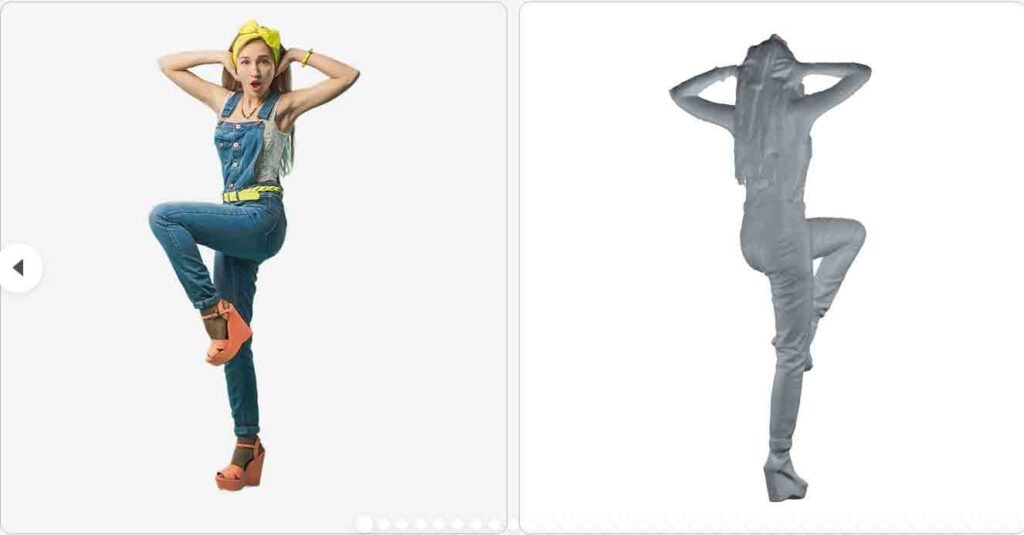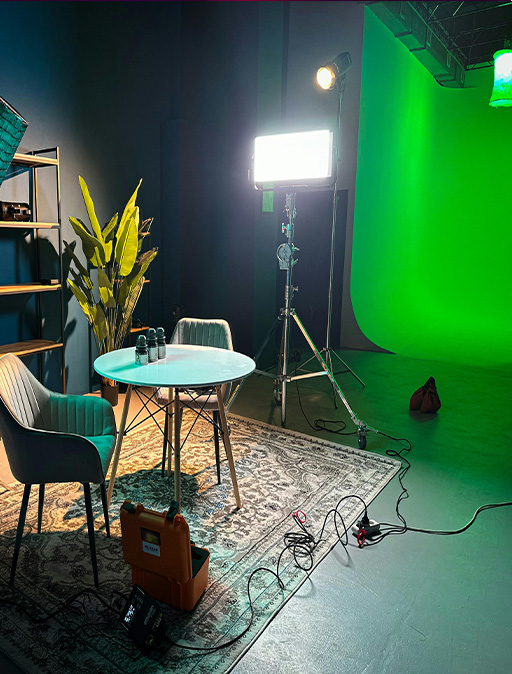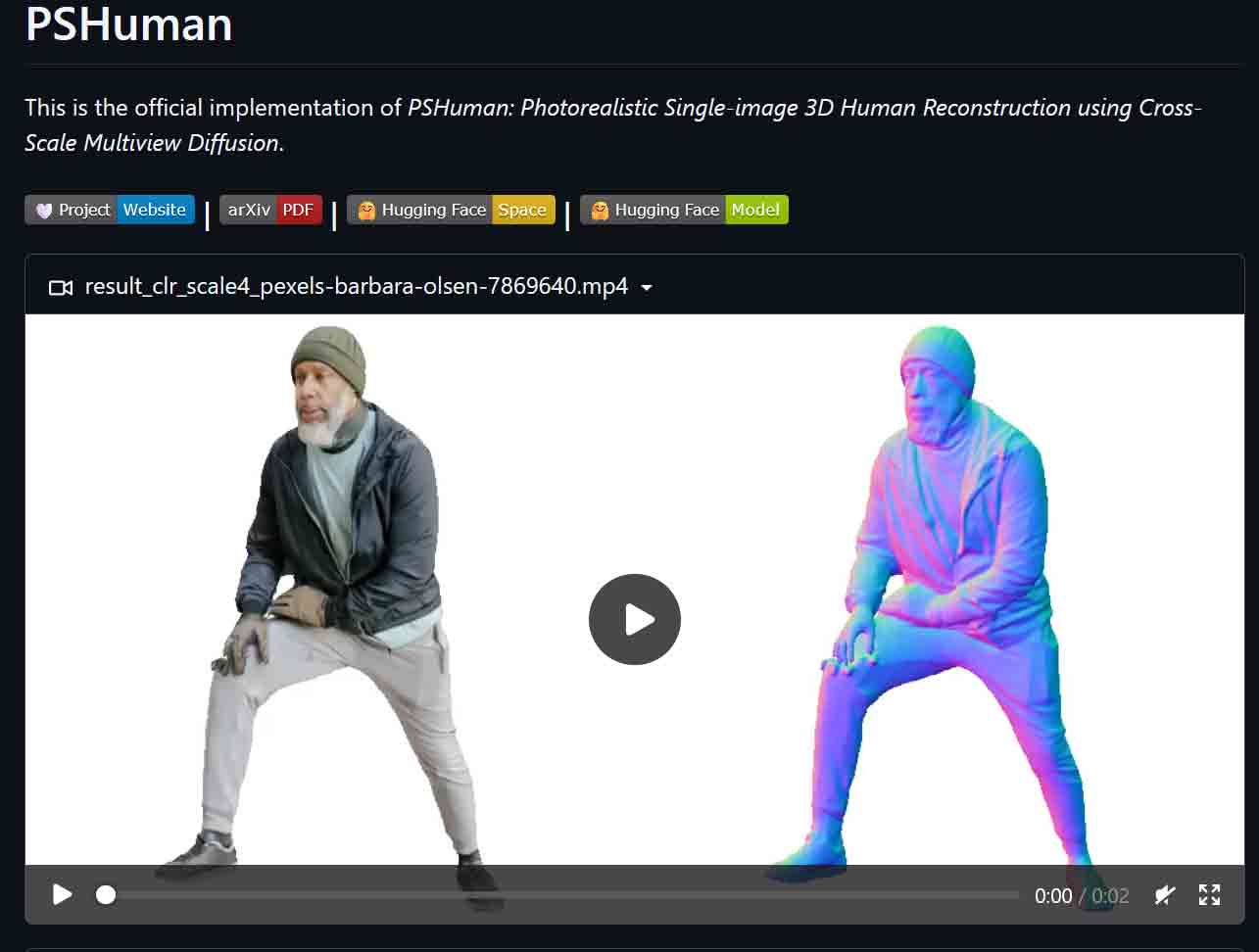In a world where augmented reality and virtual avatars are becoming ubiquitous, the ability to create a photorealistic 3D model of a person from a single photo is a groundbreaking advancement. Enter PSHuman, an open-source project developed by Peng Li and collaborators that leverages cross-scale multiview diffusion to achieve this feat. Capable of generating detailed geometry and realistic 3D human appearances across various poses in just one minute, PSHuman is a game-changer for developers, 3D artists, and AI enthusiasts alike.
Explore the project on its official GitHub repository, where you’ll find the source code, pre-trained models, and even a demo on Hugging Face. Let’s dive into what makes PSHuman so extraordinary!
What is PSHuman?
PSHuman, short for Photorealistic Single-image 3D Human Reconstruction, is the official implementation of an AI model that transforms a single image of a clothed person into a fully textured 3D model. Unlike traditional methods requiring multiple views or expensive scans, PSHuman employs cross-scale multiview diffusion to generate consistent views and high-quality textured meshes.

Key Features of the Project
- Photorealistic Quality: The results boast lifelike textures, clothing folds, and natural poses, as showcased in demo videos (e.g., result_clr_scale4_pexels-barbara-olsen-7869640.mp4 and result_clr_scale4_pexels-zdmit-6780091.mp4).
- Speed: The entire process—from input image to rendered video—takes under a minute.
- Versatility: Perfect for applications in virtual reality, virtual fashion, gaming, or animation.
- Open and Accessible: Licensed as open-source, with models available on Hugging Face for easy testing.
The project builds on prior work like ECON and SIFU for human mesh recovery, and Era3D for consistent multiview generation. A SMPL-free version released on November 30, 2024, eliminates the need for SMPL parametric models, enhancing flexibility for varied poses.
Recent Updates: Rapid Evolution
The PSHuman team is moving fast! Here are the highlights:
- November 30, 2024: Released the SMPL-free version, which performs robustly for multiview generation without SMPL constraints.
- December 11, 2024: Deployed an interactive demo on Hugging Face, thanks to Sylvain Filoni. Try it now by uploading a photo and witnessing the magic!
These updates reflect the team’s commitment to making PSHuman accessible to researchers, developers, and hobbyists.
Installation and Usage: A Quick Guide for Beginners
PSHuman is designed to be straightforward to set up on a powerful GPU setup (over 40GB of VRAM recommended for 768 resolution, with a 512-resolution version in development for RTX 4090 compatibility). Here’s how to get started:
1. Environment Setup
Create a Conda environment and install dependencies:
conda create -n pshuman python=3.10
conda activate pshuman
# PyTorch with CUDA 12.1
pip install torch==2.1.0 torchvision==0.16.0 torchaudio==2.1.0 --index-url https://download.pytorch.org/whl/cu121
# Kaolin (for 3D geometry)
pip install kaolin==0.17.0 -f https://nvidia-kaolin.s3.us-east-2.amazonaws.com/torch-2.1.0_cu121.html
# Other packages
pip install -r requirements.txtDownload the SMPLX models from OneDrive (link provided in the repo).

2. Data Preparation
- Remove the background from your image using Clipdrop or a provided script:
python utils/remove_bg.py --path $DATA_PATH - Place the RGBA images in $DATA_PATH.
3. Inference
Run the main script to generate the textured mesh and video:
CUDA_VISIBLE_DEVICES=$GPU python inference.py --config configs/inference-768-6view.yaml \
pretrained_model_name_or_path='pengHTYX/PSHuman_Unclip_768_6views' \
validation_dataset.crop_size=740 \
with_smpl=false \
validation_dataset.root_dir=$DATA_PATH \
seed=600 \
num_views=7 \
save_mode='rgb'Tip: Adjust crop_size (720 or 740) and seed (42 or 600) to optimize results for your image.
For training, refer to the paper for data preparation, then run bash scripts/train_768.sh after adjusting paths like data_common.root_dir.
Common Issues
- Insufficient VRAM? The current model requires +40GB. A lighter version is coming soon.
- No releases published yet, but the code is stable.
Related Projects and Inspirations
PSHuman draws from stellar open-source projects:
- ECON and SIFU: For single-image human mesh reconstruction.
- Era3D and Unique3D: For consistent multiview image generation.
- Continuous-Remeshing: For smooth inverse rendering.
These influences highlight the power of the open-source AI community.
Why PSHuman is a Game-Changer
In an era where AI is democratizing creation, PSHuman lowers the barriers to producing hyper-realistic 3D avatars. Imagine virtual try-ons for e-commerce, ethical deepfakes for filmmaking, or personalized medical simulations. While ethical questions around privacy arise, the open-source approach encourages responsible use.
Have you tried PSHuman?

Vset3D
Virtual Studio
Software







